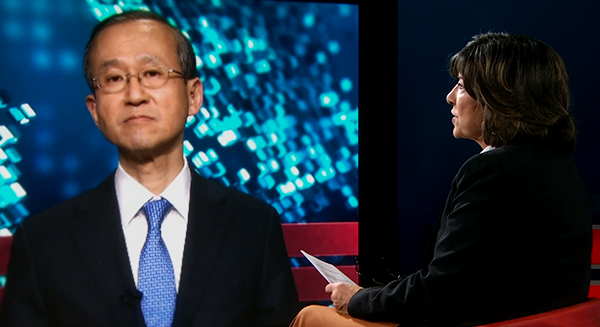뉴포커스
임성남 제1차관, CNN 인터뷰(1. 19.)
- 담당부서
- 등록일
- 2018-01-19
- 조회수
- 6240

*위 이미지 클릭시 인터뷰 동영상 페이지로 이동합니다.
S.Korea: There is value in sports diplomacy
AMANPOUR: Mr. Vice Minister, welcome to the program. Can I -
LIM SUNG-NAM, SOUTH KOREA, VICE MINISTER OF FOREIGN AFFAIRS: Thank you. Thank you for having me on again.
AMANPOUR: Well, it's good to talk to you again. And, of course, your issue is perhaps the most important issue. Let me ask you first whether you agree with Secretary Carter that one of the - or the biggest concern in a year that may show a rising risk of conflict is on your peninsula. Do you believe that?
SUNG-NAM: Well, I'm sure North Korea will be one of the biggest security concerns for the year 2018 but I believe we are in a better shape than before because we are now taking advantage of the opening in the inter- Korean relationship by having the North Koreans come to the Pyeongchang Winter Olympics and at the same time engaging in North Korea for the inter-Korean dialog.
AMANPOUR: So, when I describe as sort of a promising thaw is that correct? Am I going too far? Do you think there is an actual diplomatic, military, political thaw beyond marching together and competing at the Olympics?
SUNG-NAM: Well, I'm sure the inter-Korean dialog we are having right now with the North Koreans will contribute to creating an environment conducive to further progress in the inter-Korean relationship. But at the same time we believe we should not be too hasty in reaching any kind of a conclusion regarding where we can go at the end of the day.
AMANPOUR: So, you also heard Ash Carter say that he supports the current administration‘s version of and plans for coercive diplomacy. Does that meld with the South Korean position?
SUNG-NAM: Well, again, as Ash Carter has pointed out, I believe the defense and deterrence are the major pillar in playing the game -- vis-a-vis North Korea right now. But the other game plan is the engagement and dialog in which we will be pursuing from now on.
AMANPOUR: So, we asked, also, what game is North Korea playing? Let's go back to the extraordinary moment on New Year's Day when the North Korean leader, Kim Jong-un, gave this speech and offered that new - that - sorry, that olive branch to South Korea while also saying that he had a nuclear button on his table.
And then, of course, you had President Trump's response about having a bigger nuclear button. Take us back to there, what was going on in the Foreign Ministry when you heard Kim Jong-un speech?
SUNG-NAM: Well, I think Kim Jong-un's speech can be read from many different perspectives, but number one, he was putting a lot of emphasis upon the importance of economic prosperity. And number two, after so many years of silence in the intra-Korean relationship he was offering the talks between the South and the North.
And he was also making it clear the intention to come to Pyeongchang Winter Olympics. So all in all, we believe that the speech made by the young leader in Pyongyang was a signal to Korea, as well as the international community, that they are interested in talks.
AMANPOUR: So, just give us your best assessments. Do you believe that the, you know, pretty hard line the United States has taken and even the very colorful tweets that President Trump has used, including a number of insults to Kim Jong-un and they've been flying back and forth between both capitals. Do you think in a way, this kind of new dynamic forced this speech on New Year's day? Do you think that could have played any part in it?
SUNG-NAM: Well, when we had a discussion about this issue with our American counterparts, we have made it very clear that the strong alliance between Seoul and Washington has been helping a lot, the situation to go in the right direction. I'm sure when Pyongyandg makes the kind of announcement as made by the leader in the beginning of this year, they must have looked at all dimensions related with the current situation, including the cost they are paying because of sanctions in place.
AMANPOUR: All right, so you think they're sort of taking it onboard, in a way. Can I ask you about the recently concluded summit in Vancouver? It was South Korea, the United States, Canada, obviously, and many, many of your allies who supported you and fought alongside you during the Korean War. But, of course, Russia and China were not invited. And yet, they're pretty instrumental to a solution. What did you achieve in Vancouver? And do you think that those two countries should have been at the table?
SUNG-NAM: Well, I think the Vancouver meeting has sent a very balanced signal to Pyongyang. Number one, it has clearly indicated a willingness of the international community to keep the sanctions in place, until the moment when Pyongyang makes the right decision about their nuclear and missile programs.
But on the other hand, the Vancouver meeting also signaled to Pyongyang very clearly that the eventual purpose of exerting sanctions and pressure upon Pyongyang is in bringing Pyongyang to the denuclearization talks. And everybody who was around the table in Vancouver was interested in the diplomatic solution of the issue at hand. And I'm sure, while Moscow and Beijing were not around the table in Vancouver, they must have paid attention to those balanced messages out of the meeting.
AMANPOUR: Well, you know President Trump in an interview this week has accused Moscow of actually helping North Korea skirt these sanctions. Is that something you believe is happening? Is that what Moscow's doing?
SUNG-NAM: Well, I'm sure the implementation of the U.N. Security Council sanctions is not in 100 percent perfect shape. There might be some loopholes; there might be areas we can do more. Perhaps the Russian cooperation might be needed from that kind of perspective.
AMANPOUR: So that's a diplomatic way of saying, Russia should stop undermining the global pressure?
SUNG-NAM: Well, I would rather say Russia should be more forthcoming in terms of implementing the sanctions.
AMANPOUR: Got it, all right. So everybody wants to know whether this sort of Olympic thaw, this sort of Olympic spring, if you would like, is going to last beyond the Olympics. Do you think this momentum between your two countries has legs beyond the games?
SUNG-NAM: Well, I should tell you an English saying that goes; a journey of a thousand miles begins with a single step. We just began to talk with North Koreans, and it might be too early to reach any kind of conclusion like the one you just presented.
AMANPOUR: All right. So it's still -- that's still a work in progress because as you know, your Japanese counterparts say, beware the north, you know, trying to sort of cozy up while just trying to buy time for their inevitable program.
SUNG-NAM: Well, there can be many ways of looking at the North Korean intentions, but if we look at this situation very objectively, as I already indicated at the beginning of the program, the security situation on the Korean peninsula might be in a slightly better shape, say, than about a month ago, because we just have begun to engage the North Koreans in a dialogue.
AMANPOUR: Well, it's really important, and everybody clearly is very concerned about what happens, and what transpires. Particularly the people of Hawaii, not so long ago, I mean, what did you think? What went through your mind when you saw this false alert and people in Hawaii, you know, diving for cover just about. And former Defense Secretary William Perry wrote, it highlighted an emphatically genuine risk that human error or technological failure or some fatal combination of both could result in a horrific nuclear catastrophe.
SUNG-NAM: Well, I think what happened in Hawaii clearly shows the danger posed by the North Korean nuclear programs. But at the same time, I'm happy to know that through the inter-Korean dialogue, we have been able to revive the line of communication between the South and the North, which has been severed for a long time.
So once again, keeping the line of communication open and having them engage in dialogue will be essential in restoring the peace and stability on the Korean Peninsula at the end of the day.
AMANPOUR: And I guess finally, what do you expect the mood to be at the Olympics, the mood amongst South Koreans and others when the North Koreans come in, when they march under the unified flag? And I ask, because there's a big uproar, as you know, in your country already by uniting the hockey team. Some of the South Korean hockey professionals say that's just going to dilute your country's ability to be the best.
SUNG-NAM: Well, there can be once again many voices free and open society like Korea, but I would like to remind you what happened in the early 1970s between China and the United States. It was through the ping pong games through which the Chinese and the Americans could lay the foundation for the normalization of the relationship; so sports event could be a very useful opportunity for the two Koreas to engage in a process of reconciliation down the road.
AMANPOUR: Well that was the last word, and that was a very, very good last word. Minister Lim Sung-nam, thank you so much indeed for joining us.
- 메뉴담당부서
- 정책홍보담당관실
- 전화
- 02-2100-8252


